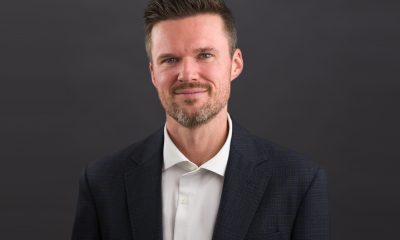Interviews
Denelle Dixon, CEO of the Stellar Development Foundation – Interview Series

Denelle Dixon is the CEO and executive director of the Stellar Development Foundation — a nonprofit organization that supports the development and growth of Stellar, an open-source blockchain network that connects the world's financial infrastructure.
You were previously involved with Mozilla, having joined in 2012 as an Associate General Counsel and you rose through the ranks to eventually become the COO. What did you learn from this experience?
My time at Mozilla really helped shape the way I look at the internet and its effects and influence on innovation. It also allowed me to focus on the intersection of three areas (public policy, business and technology) that I am intellectually and emotionally connected to. It is these three areas that I want to continue to focus on for the rest of my career because of their importance to a vibrant, directed and innovative economy.
Working at Mozilla was my first experience with the open source philosophy and it inspired my deep belief in the value of open source technology. I’ve said it before, but it all comes down to openness, transparency, collaboration and diversity – what I view as the core values of open source.
When activity and progress is openly documented, it allows the community to iterate and develop. I’m always excited when I hear about projects building on Stellar before even contacting someone within our organization. That means we’re providing accessible documentation with meaningful information.
Transparency allows an open source project to communicate clearly to the community and to hold itself accountable to its mission and direction. At SDF, we spent 2019 working to become more transparent about our work and the work we do for Stellar. We created our new mandate, created and described XLM accounts that are trackable and traceable, and created a roadmap that is clear and direct. In 2020, we continue to be more vocal about our work, and about the work on being done on Stellar. This transparency holds us accountable to both say what we are doing and to do what we are saying. Transparency builds trust.
Open source technology is fully reliant on effective collaboration for success and a healthy collaborative spirit fosters innovation and creativity. And naturally, in a collaborative environment, diverse opinions and voices bring value through an array of perspectives and values.
In March 2019, you were then appointed as both the Executive Director and CEO of The Stellar Development Foundation. What was it that attracted you to this Foundation?
Simply put, the mission, the work, the impact and the opportunity to grow a company, culture and ecosystem. I know that I am at my very best when my work has a purpose, and when I’m pushing for change. The vision is big: Stellar and SDF hope to unlock the world’s economic potential by making money more fluid, markets more open, and people more empowered. And thinking big, beyond any one product, beyond any single issue – that’s what has always driven me. I knew it would be my mandate to focus on the intersection of public policy, business and technology – it was too good to pass up.
Could you give us a breakdown of the mission behind the Stellar Development Foundation?
SDF is a non-profit, non-stock organization that has no shareholders and is beholden only to its mission – creating equitable access to the global financial system. SDF shepherds the codebase for the Stellar network and fosters the growth of the ecosystem. It was created to help maintain Stellar’s codebase, support the communities building on the network, and serve as a voice to regulators and institutions.
Ultimately, we’re seeking to create equitable access to the global financial system by making money more fluid, markets more open and people more empowered.
What has been your number one priority since taking over as CEO?
Since joining SDF I’ve been focused on organizational development, ecosystem development (including public policy) and further development of the technology and products. We have developed a clear strategy and attainable goal around having Stellar become the global payment standard by 2025. Our strategy is developed around three pillars — ensuring robustness of our technology, fostering sustainable use cases, and being the blockchain people know and trust.
How can the Stellar Development Foundation best partner with commercial entities without neglecting its core mission?
We look at commercial partnerships as ways to introduce even more people to the Stellar ecosystem and the benefits Stellar and the diverse players in the ecosystem have to offer. We also ensure that existing participants in the ecosystem are connected with another to further develop the growth.
Let’s use our recent partnership with Samsung as an example. Samsung integrated Stellar into their Samsung Blockchain Keystore, which means that Stellar users can now store their private keys on certain Samsung Galaxy smartphones. Most importantly, developers can create blockchain-based apps and services for those phones.
This means a lot to our growing community and companies and developers building projects on our ecosystem. By partnering with one of the biggest smartphone suppliers in the world, we’re opening up a whole new network of users that can benefit from our technology.
Could you discuss the challenges of bringing cryptocurrency to the unbanked, especially with cryptocurrency which has a steep learning curve?
The companies we partner with are all focused on seamless integration and many users likely don’t even realize they’re using crypto to transact and pay bills. It is using the technology to solve problems that users face and to make it easy for users to engage.
Saldo, for instance, is a company allowing migrant workers to support family members in Mexico. The remittance process of sending money back home is slow, difficult and expensive. Saldo lets working in the US send funds directly to a recipient’s utility account back home in Mexico. Because Saldo issues a Mexican peso-backed token and settles on the Stellar network, senders can start the payment in USD and automatically convert the payment to MXN in a single immediate and transparent transaction.
The end result is a utility account being paid. The senders and recipients don’t even touch cryptocurrency!
Out of all the partnerships and projects being developed on the Stellar blockchain, which has you the most excited?
Obviously, it’s not an easy task picking one single project or partnership. We wouldn’t be working together if we weren’t excited by the promise of what they have to offer! However, if I were to pick just one at the moment, it would be DSTOQ. They’re giving people in emerging markets – populations that have long been ignored – access to ways to invest affordably. How cool is it that someone in Vietnam has access to bluechip shares, or fractionalized shares, that they couldn’t easily get before?
Mozilla was designed to be open source, and the Stellar Development Foundation also works on an open source framework. Can you discuss the importance behind being open source and why it is so beneficial?
Open source projects like Stellar allow for limitless growth and creativity and exceed all other models for building — particularly for building networks. There are several reasons I’m such a strong proponent of open source.
The hallmark of a true open source project is documentation. At SDF, we recognize that creating documentation and readily accessible records of our work allows others to build and improve upon Stellar. We’ve spent a lot of time poring over our documentation and filling in gaps and creating video and written explanations to show how things work on our network. We love it when we hear about projects that were built on Stellar without ever talking to anyone at SDF — documentation wins.
Open source projects are transparent, which allows for clear communication to the community. It also means we’re held accountable to our mission and direction. At SDF we established our new mandate, created and described XLM accounts that are trackable and traceable, and created a clear and direct roadmap. Transparency builds trust while holding us accountable to both say what we are doing and to do what we are saying.
Another reason I believe open source is so beneficial is that it relies on collaboration from many to achieve success. At SDF we work in constant collaboration with our community so our progress and growth is the fruit of our shared labor. A collaborative spirit fosters innovation and creativity.
Lastly, open source is diverse. Open source projects work beyond borders and by their nature create diversity of thought, background, and culture. This allows the best minds from all of the world to share ideas and improve the work that is done. With this diversity we learn how payments work in different contexts and in different regions of the world — this helps us to ensure that the solution can truly be global and innovative.
You wrote an article regarding the importance of gender and racial diversity in the workplace. How has the Stellar Development Foundation risen to the challenge of creating a more diverse workplace?
We all truly believe that tech workplaces should be more representative of the communities that will eventually be using the products. True to our open source culture, we have been fostering an internal dialogue about the steps we need to take to be proactive in the short, medium and long term to have a workplace that reflects our DE&I values.
Is there anything else that you would like to share regarding the Stellar Development Foundation?
Our community and ecosystem are an important part of our success, bringing and working together to solve our greatest challenges, especially the ones that have been laid bare this year. For the second year, we’ll be hosting Meridian, a forum we’ve created to address systemic and institutional problems. This year, it will be a virtual conference and free for everyone, focused on our shared challenges on a global scale. Join us!
Thank you for the interview. I really enjoyed learning about this project, readers who wish to learn more should visit the Stellar Development Foundation.












